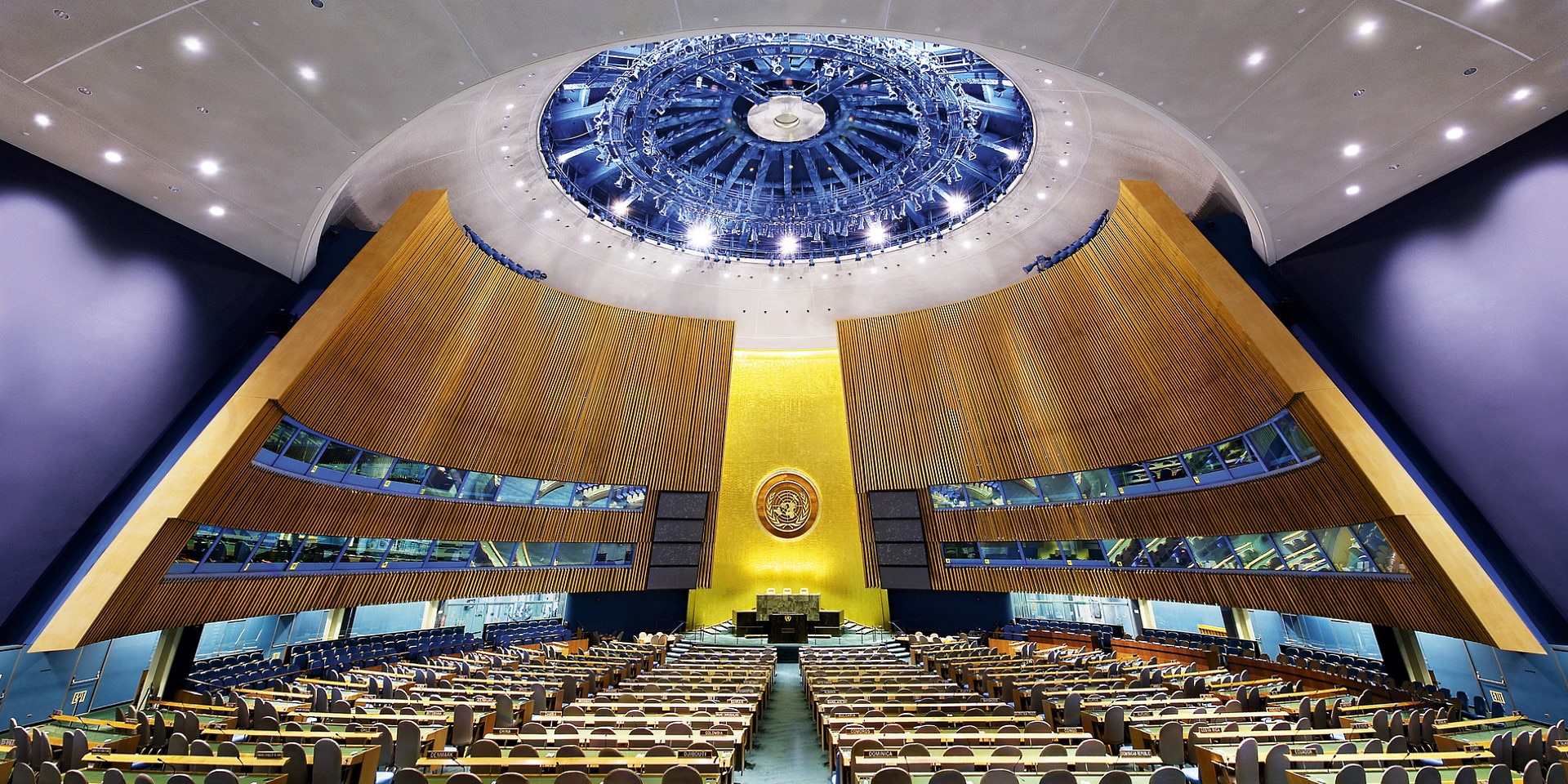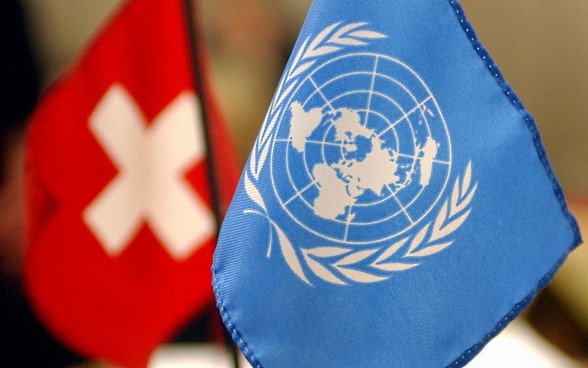What does the UN General Assembly do and why does Switzerland participate?
The 75th session of the UN General Assembly opens on 15 September. The session opens with the High Level Week, which is taking place online for the first time. Switzerland has four priorities: addressing the consequences of COVID-19, UN reform, cybersecurity and digital governance, and International Geneva.

2020 marks 75 years of the UN. © Keystone
The new session of the UN General Assembly begins on 15 September and will last a year. As always, the High Level Week will bring together hundreds of heads of state and delegations from all over the world. The President of the Swiss Confederation, Simonetta Sommaruga, and the head of the FDFA, Federal Councillor Ignazio Cassis, are representing Switzerland.
A global gathering
All 193 member states of the United Nations, including Switzerland, take part in the General Assembly. This global gathering opens with a High Level Week, followed by sessions throughout the year.
The main media event of the first week is the general debate. Here the representatives of each country take turns to speak for 15 minutes. States and delegations also use this opportunity to host side events and bilateral talks with their counterparts from all over the world.
This year, owing to COVID-19, the High Level Week will take place in virtual conferences and meetings, instead of at the UN headquarters in New York. It has been extended to last two weeks, from 21 September to 2 October 2020.

Switzerland and the UN – same goals and principles
The aims and principles of the UN Charter broadly coincide with the aims and values set out in Switzerland's federal constitution. The UN is therefore an essential instrument for Switzerland to safeguard its interests and pursue its foreign policy objectives. It also provides Switzerland with a multitude of other opportunities to exert an influence. As an active UN member state and host state to many international organisations, Switzerland is able to promote its interests and values globally and work to uphold and strengthen international law.
In its Foreign Policy Strategy 2020–23, the Federal Council emphasises the key role of the UN in Switzerland's foreign policy.
75th UN General Assembly web file – Switzerland’s priorities
In pursuit of its Foreign Policy Strategy and candidature for a seat on the Security Council in 2023–24, Switzerland has set four priorities for this year:
- addressing the consequences of COVID-19,
- UN reform,
- cybersecurity and internet governance,
- International Geneva
The web file provides regularly updated information on the 75th UN General Assembly.
All states represented equally
The annual General Assembly is a space for dialogue, where the member states debate the main challenges we face in the world today, such as fighting poverty, upholding human rights, maintaining peace and combating climate change.
The General Assembly's mandate is very broad. It approves the UN budget and the reports of the other UN bodies. It formulates resolutions regarding the conduct of member states, establishes subsidiary bodies (e.g. the Human Rights Council), drafts the texts of international conventions, sets up investigative mechanisms and decides the details of summits.
Each member state has one vote, so that all states are represented equally.
Two questions for...
Flavio Milan who leads the FDFA unit that coordinates with the UN
Why is it important for Switzerland to be involved in the UN General Assembly?
Switzerland and the UN share the same goals and values: fighting poverty, upholding human rights, democracy, the peaceful coexistence of peoples and the preservation of natural resources. In light of this, the Swiss electorate voted in favour of our joining the UN as a full member in 2002.
Since its accession, Switzerland has been using the General Assembly as a key multilateral forum to promote its stance on important issues and to forge and strengthen partnerships – and thereby represent our country's interests. Switzerland is often a driving force behind new approaches in the General Assembly. Together with five other countries, we initiated the very first UN resolution on COVID. For the members of our Federal Council, the annual high-level opening week of the General Assembly is also a good opportunity to make contacts and network.
The debate is currently dominated by rising geopolitical and economic tensions, and the climate emergency. Is a body like the General Assembly still relevant?
Today more than ever! Today's challenges need coordinated solutions that go beyond a country's borders. In times like these, maintaining dialogue between states has never been more important. Multilateral bodies like the UN are therefore key, especially for small and medium-sized countries that are not represented in exclusive formats like the G7 or the G20.
As part of the UN reform process, we are committed to ensuring that the whole UN system is as effective and efficient as possible. The UN General Assembly is the only body in the world where all countries get together to discuss every major global issue. The current global political challenges exist despite, not because of, the UN. At the same time, finding consensus among 193 states is of course challenging and time-consuming. Sometimes we fail. But you still have to try. There is currently no comparable alternative to address the major problems of our time.
Links
- Federal Council sets four Swiss priorities for UN General Assembly's 75th session, press release, FDFA, 11 September 2020
- UN General Assembly's 75th session. Dossier, FDFA
- Article – "Cooperation between states is as important today as it was 75 years ago."
- General Assembly, UN
- Switzerland and the UN, FDFA
- Foreign Policy Strategy 2020–23, FDFA
- Twitter account of Switzerland at the United Nations
Documents
- Report on the implementation of Switzerland's priorities for the 74th session of the UN General Assembly, Federal Council report to the Foreign Affairs Committees, 24 June 2020 (PDF, 6 Pages, 84.1 kB, German)
- Switzerland's priorities for the 75th session of the UN General Assembly, Federal Council report to the Foreign Affairs Committees, 24 June 2020 (PDF, 3 Pages, 457.0 kB, English)
